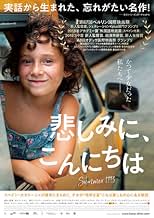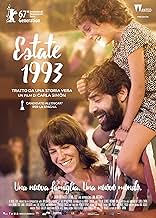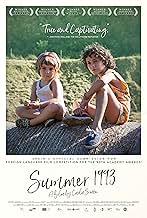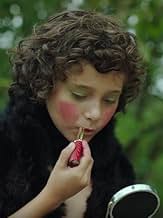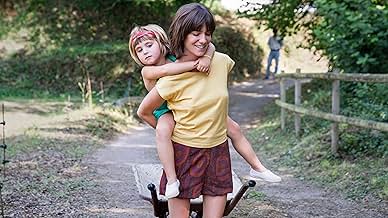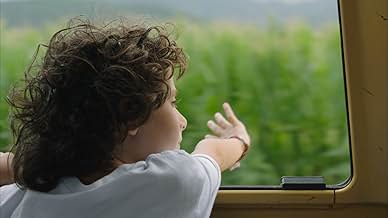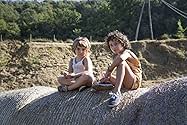IMDb-BEWERTUNG
7,1/10
8811
IHRE BEWERTUNG
Nach dem Tod ihrer Mutter wird die sechsjährige Frida zur Familie ihres Onkels aufs Land geschickt. Aber Frida fällt es schwer, ihre Mutter zu vergessen und sich an ihr neues Leben anzupasse... Alles lesenNach dem Tod ihrer Mutter wird die sechsjährige Frida zur Familie ihres Onkels aufs Land geschickt. Aber Frida fällt es schwer, ihre Mutter zu vergessen und sich an ihr neues Leben anzupassen.Nach dem Tod ihrer Mutter wird die sechsjährige Frida zur Familie ihres Onkels aufs Land geschickt. Aber Frida fällt es schwer, ihre Mutter zu vergessen und sich an ihr neues Leben anzupassen.
- Auszeichnungen
- 38 Gewinne & 58 Nominierungen insgesamt
Paula Blanco Barnés
- Cesca
- (as Paula Blanco)
Dolores Fortis
- Carnissera
- (as Dolors Fortis Artacho)
Tere Solà
- Senyora Carnisseria
- (as Tere Solà Nasarre)
Josep Torrent
- Doctor
- (as Josep Torrent Alabau)
Cristina Matas
- Infermera
- (as Cristina Matas Calvet)
Empfohlene Bewertungen
After the death of her mother, young Frida is left an orphan. She moves from Barcelona to a small town to live with her uncle and aunt.
This Spanish film starts as a gentle coming-of-age story. There is the tragedy of her mother's death but the movie is still pretty gentle. The mother who pulls her child from Frida is what sets this off. Everything turns. Everybody's reactions take a different undertone. The filmmaker maintains her delicate touch but there is real emotional power. It's a compelling story.
This Spanish film starts as a gentle coming-of-age story. There is the tragedy of her mother's death but the movie is still pretty gentle. The mother who pulls her child from Frida is what sets this off. Everything turns. Everybody's reactions take a different undertone. The filmmaker maintains her delicate touch but there is real emotional power. It's a compelling story.
Carla Simon's well-observed tale of a young girl who's orphaned and forced to move into her uncle's home. Frida (Laia Artigas ) is the girl and her uncle Esteve (David Verdaguer) has a wife Marga (Bruna Cusi) and an even younger daughter Anna (Paula Robles).
Frida's mother's passing of an "illness" isn't defined at the outset, but, the constant medical tests the young girl has to be subjected to and the panic that ensues when she bleeds on a playground give you a pretty good idea of what will be revealed (not to mention setting it 25 years ago). But, SUMMER 1993 isn't really about that topic, it's more about coping without parents, and trying to blend in with her uncle's family. It's often awkward, and even painful, but it's never less than perceptive even if it never quite reaches the next level. The movie's path never seems in doubt, no matter the obstacles put in the characters' way. The music selections are interesting and unexpected with touches of soulful jazz. The ending concludes on a different note than one might forsee - but, it's just about right.
This was Spain's official submission for the Foreign Language Oscar last year (it was not nominated or short-listed).
Frida's mother's passing of an "illness" isn't defined at the outset, but, the constant medical tests the young girl has to be subjected to and the panic that ensues when she bleeds on a playground give you a pretty good idea of what will be revealed (not to mention setting it 25 years ago). But, SUMMER 1993 isn't really about that topic, it's more about coping without parents, and trying to blend in with her uncle's family. It's often awkward, and even painful, but it's never less than perceptive even if it never quite reaches the next level. The movie's path never seems in doubt, no matter the obstacles put in the characters' way. The music selections are interesting and unexpected with touches of soulful jazz. The ending concludes on a different note than one might forsee - but, it's just about right.
This was Spain's official submission for the Foreign Language Oscar last year (it was not nominated or short-listed).
Very delicate Catalan movie about an orphan girl whom an uncle and his wife take care of, together with the child's cousin. Although living with a good family who gives her love, she suffers, is jealous about the other girl, lies and has michievous attitide, feels revolted. Not action-oriented, the story is however deep in dealing with all feelings involved, and all actors are very convincing, inclusing the children. As the movies advances we know a little more about the girl's mother. It is also an excelent film about being a child. Worth watching.
This is the story of a little girl from Barcelona who is adopted by her aunt's family in the countryside, after her mother passes away. Largely autobiographical, "Summer 1993" is filmed in a very naturalistic style and almost feels like a documentary. The director, Carla Simón, pays special attention to the kind of small details that can make a big difference to a young kid. Although not very much seems to be going on in the surface, one can see that a very important drama, charged with intense emotions, is going on deep in the lives of this little person and the family that has welcomed her. The acting is all very effective and particularly Laia Artigas, who plays the main character, is surprisingly strong and charismatic for someone her age.
"Summer 1993" is one of many Spanish films that observe the world through the eyes of a child. Other examples include the classics "Cría Cuervos", "The Spirit of the Beehive" and "El Sur". The contemplative gaze and relatively slow pace remind me of "En Construcción", a documentary by another Catalan filmmaker, José Luis Guerín.
"Summer 1993" is one of many Spanish films that observe the world through the eyes of a child. Other examples include the classics "Cría Cuervos", "The Spirit of the Beehive" and "El Sur". The contemplative gaze and relatively slow pace remind me of "En Construcción", a documentary by another Catalan filmmaker, José Luis Guerín.
This is a visual narration of the child's mentality on family, loss, life, game and death.
I mostly loved that the movie avoids making audience put in a ultra-sensitive position. The movie tells its story by gently touching our emotions although it is very easy to fall into trap of agitation, with a naturally sorrowful story.
Wusstest du schon
- WissenswertesLaia Artigas and Paula Robles were cast for Frida and Anna respectively because they displayed a power struggle relationship during the casting process.
- VerbindungenFeatures El retorno de D'Artacan (1990)
- SoundtracksToma mucha fruta
Written by Chop Suey (as Cesar Sala Garcia) and David Pallol Font
Performed by Bom Bom Chip
Top-Auswahl
Melde dich zum Bewerten an und greife auf die Watchlist für personalisierte Empfehlungen zu.
- How long is Summer 1993?Powered by Alexa
Details
Box Office
- Budget
- 960.000 € (geschätzt)
- Bruttoertrag in den USA und Kanada
- 185.903 $
- Eröffnungswochenende in den USA und in Kanada
- 21.307 $
- 27. Mai 2018
- Weltweiter Bruttoertrag
- 3.031.379 $
- Laufzeit1 Stunde 37 Minuten
- Farbe
- Sound-Mix
- Seitenverhältnis
- 1.85 : 1
Zu dieser Seite beitragen
Bearbeitung vorschlagen oder fehlenden Inhalt hinzufügen



